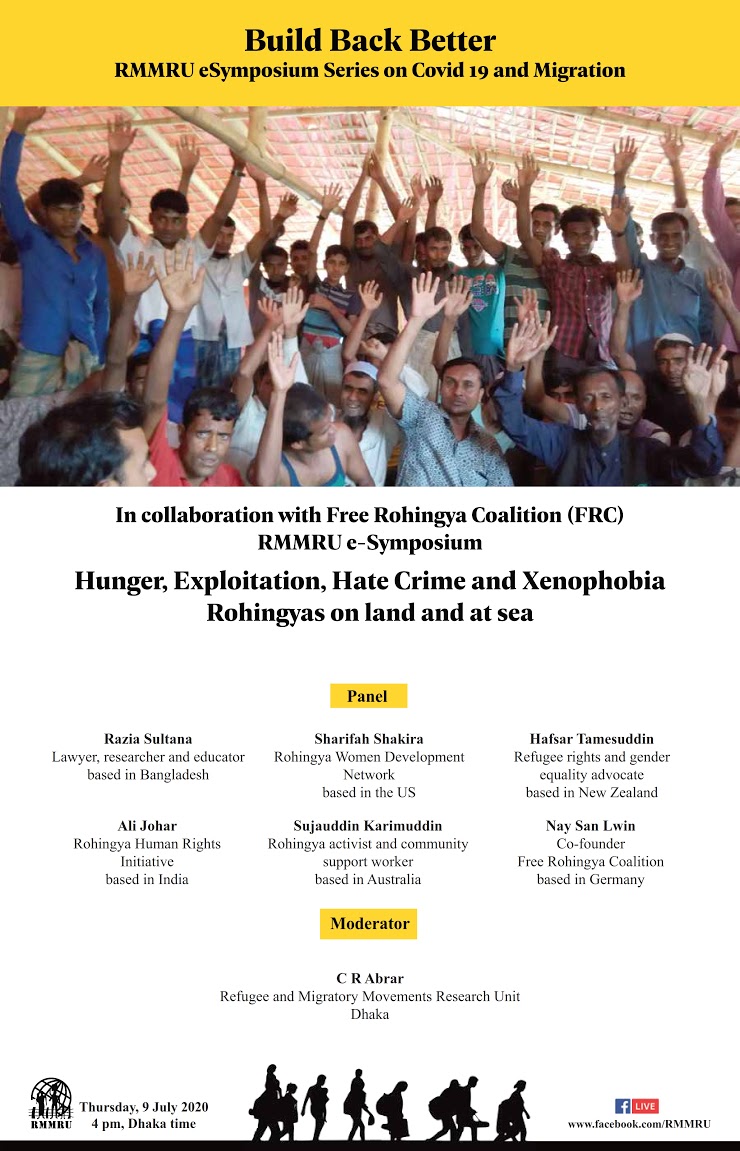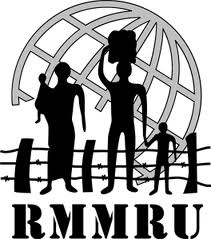RMMRU eSymposium on
Hunger, Exploitation, Hate Crime and Xenophobia
Rohingyas on Land and at Sea
Press Release
Thursday, 9 July 2020

Covid-19 pandemic has disproportionately harmed refugees, asylum seekers and stateless people. The Rohingyas are no exception. The lockdowns and economic slowdown in different countries have robbed Rohingyas of their livelihood opportunities and pushed them into an abyss of hunger and malnutrition. It has also exposed them to exploitation, hate and xenophobia. These observations were made at an eSymposium organized by Refugee and Migratory Movements Research Unit in collaboration of Free Rohingya Coalition held today. Among other things the participants demanded that international community should ensure Myanmar pay appropriate reparations to the countries that are adversely affected by refugee flows. They also demanded littoral states of Andaman Sea and South China Sea to immediately allow the drifting boats to dock on land. Speakers also noted that there is an urgent need that states and donors to recognize the Rohingya community’s agency and create opportunities for self empowerment and entrepreneurship.
Sharifa Shaqira of Rohingya Women Development Network based in United States narrated the plights of Rohingyas drifting at sea. She observed In Myanmar Rohingyas have no future and lead a sub-human life. They are forced to take help of traffickers to escape the atrocious conditions at home, she noted.
Ali Johar from, a cultural activist and youth leader in India highlighted the need for access to education for the Rohingya community. He said in the absence of education an entire generation of Rohingya will grow up illiterate becoming a burden on the host society.
Sujauddin Karimuddin, a Rohingya Community leader in Australia said “being refugees is not our choice; circumstances compel us to move to other lands”. He urged all countries of asylum to allow refugees to live in dignity until they return home.
Hafsar Tamisuddin, Rohingya gender activist based in New Zealand bemoaned that the states and international actors thus far have mainly shied away from calling mass atrocity crime against the Rohingya as genocide and Rohingyas in other lands as refugees. Reminding the audience at one time Rohingyas also owned property and many are educated, she said “what we need is support, not charity.”
Nay San Lwin, Coordinator of Free Rohingya Coalition based in Germany regretted that the UN mandated agency UNHCR in most cases failed to provide adequate protection to refugees and ensure their rights as refugees. They are merely providing services for survival of refugees, he observed.
The moderator of the session, Dr C R Abrar of RMMRU, said that there is little likelihood that UN Security Council will take action against the rogue Burmese state; therefore onus lies on powerful states to impose sanctions on Myanmar. He also called for global civil society to stand in solidarity with Rohingyas to establish their rightful claims to Myanmar citizenship.
Recommendations of the RMMRU-FRC
eSymposium on
Hunger, Exploitation, Hate Crimes and Xenophobia: Rohingyas on Land and at Sea
9 July 2020
- International community, particularly the UN and powerful states, should take effective actions so that Myanmar abides by the ICJ directive to stop its genocidal acts against the Rohingya and create enabling conditions (such as restoring the citizenship rights) for repatriation of all Rohingyas to their homeland under protected condition.
- The international community should ensure Myanmar pays appropriate reparations to the countries that are adversely affected by its actions contributing to the refugee flow incurring huge costs: social, economic and environmental.
- The littoral states of Andaman Sea and South China Sea should immediately allow the drifting boats with to dock on land so that lives of hundreds of Rohingyas on board, including women and children are saved.
- In many countries Rohingyas have to endure various forms of abuse, hate crimes and xenophobia. The host countries should make every effort to counter the growing discourses of fear and loathing of Rohingyas as “Covid-19 carriers”, “drug mules”, “agents of human traffickers” or a threat to “national security” as those echo the state ideology of Myanmar, the main perpetrator of genocide.
- In spite of being the world’s most persecuted minority and being subjected to 40-years of chronic waves of genocidal purges by the Myanmarese state Rohingyas have proven themselves to be one of the most resilient and non-violent communities of the world. The burgeoning discourse, shaped by the manipulative Mynamarese state in connivance of pliant global media and some powerful states that have important stakes in Myanmar, of presenting Rohingyas as a security threat should be countered by facts (and not perception) by all concerned: governments, the media and the global civil society.
- If Rohingyas are expected to rebuild their communities in safety and peace after they return home from countries of their asylum then their young generation ought to be given opportunity to develop their human potentials. This entails all Rohingya children and youth be given the opportunity to access to appropriate education and skill development.
- In some countries Rohingyas are often subjected to severe curtailment of physical movement even within the refugee communities, mistreatment, threats of reduction of food, and deliberate and sustained policies of Internet ban. Those countries should immediately cease from resorting to such measures and respect the rights and dignity of Rohingya asylum seekers and refugees.
- Instead of treating the Rohingyas as beneficiaries of charity and relief there is an urgent need by all quarters (host states, donor agencies, intergovernmental actors and NGOs) to recognize the community’s agency and create opportunities for self-empowerment and entrepreneurship. This will reduce the pressure on the host countries and international actors, as well as prepare the community members for their eventual reintegration in Arakan after their return to Myanmar.
- The forced large scale inflow of refugees fleeing persecution often creates pressure on the host communities affecting their regular life and livelihood. States, international agencies and non-governmental actors should ensure that concerns of the host communities are taken into account in framing of service provisions such as education, health, sanitation and the like.
- Mechanisms and opportunities should be created so that Rohingyas are included in the discussions in framing of policies and their implementation that affect their lives and the future of their communities.
***
For a PDF version of this report, click here



